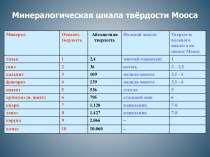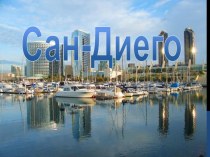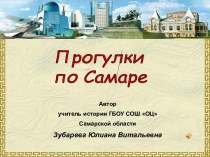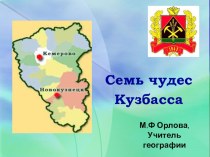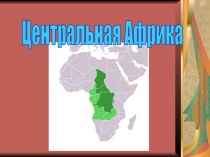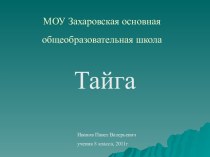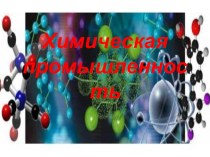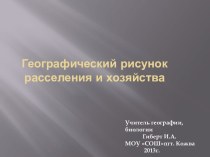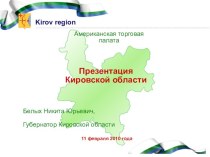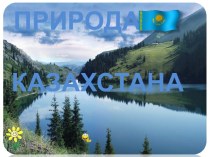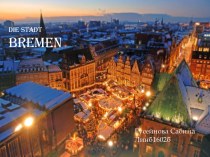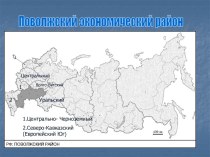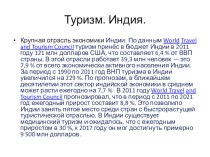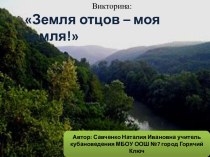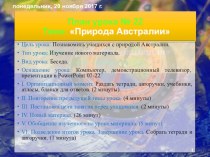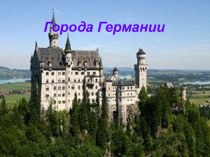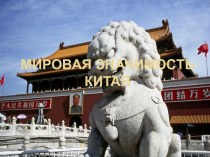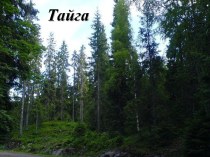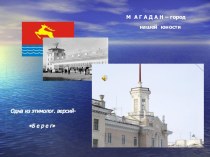- Главная
- Разное
- Бизнес и предпринимательство
- Образование
- Развлечения
- Государство
- Спорт
- Графика
- Культурология
- Еда и кулинария
- Лингвистика
- Религиоведение
- Черчение
- Физкультура
- ИЗО
- Психология
- Социология
- Английский язык
- Астрономия
- Алгебра
- Биология
- География
- Геометрия
- Детские презентации
- Информатика
- История
- Литература
- Маркетинг
- Математика
- Медицина
- Менеджмент
- Музыка
- МХК
- Немецкий язык
- ОБЖ
- Обществознание
- Окружающий мир
- Педагогика
- Русский язык
- Технология
- Физика
- Философия
- Химия
- Шаблоны, картинки для презентаций
- Экология
- Экономика
- Юриспруденция
Что такое findslide.org?
FindSlide.org - это сайт презентаций, докладов, шаблонов в формате PowerPoint.
Обратная связь
Email: Нажмите что бы посмотреть
Презентация на тему Projekt work on the subject Kazan
Содержание
- 2. TABLE OF CONTENTS:IntroductionPopulation/ethnicity, religionLanguage Culture/ Theatres and museumsSightseeng`s of Kazan Climate
- 3. INTRODUCTIONKazan is the capital of Tatarstan Republic. Kazan
- 4. POPULATION/ETHNICITY, RELIGIONThe population of my city is multinational
- 5. LANGUAGEThe Russian language is widely spoken in
- 6. CULTUREThe Islamic religion and culture of the people suffered
- 7. CULTUREHere were born the great poets Utyz Imyani,
- 8. CULTURE
- 9. THEATRES AND MUSEUMS People of Kazan are also keen theatre
- 10. THEATRES AND MUSEUMS Museums play an important role in cultural
- 11. SIGHTSEENG`S OF KAZANKazan Kremlin - a holistic architectural ensemble that
- 12. SIGHTSEENG`S OF KAZAN Kul Sharif Mosque The fact that Tsar
- 13. SIGHTSEENG`S OF KAZANThe most famous building of Kazan -
- 14. CLIMATEKazan has a humid continental climate and
- 15. CoclusionKazan is the place which is worth
- 16. USED LITERATURE https://ru.wikipedia.org/wiki/https://www.inyourpocket.com/kazan/kazan-sightseeinghttp://tokazan.com/document/citysights.html
- 17. Скачать презентацию
- 18. Похожие презентации
TABLE OF CONTENTS:IntroductionPopulation/ethnicity, religionLanguage Culture/ Theatres and museumsSightseeng`s of Kazan Climate

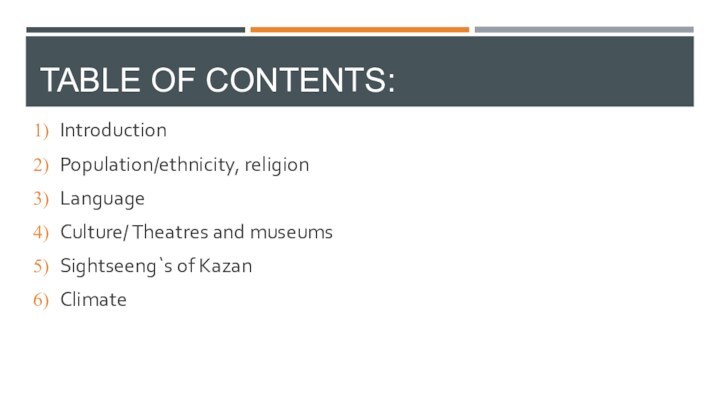
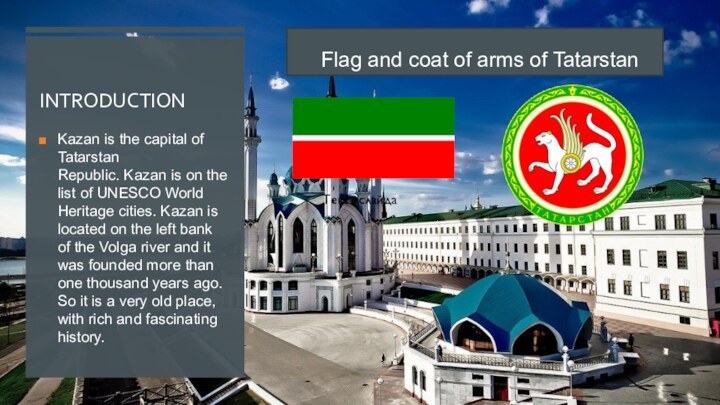
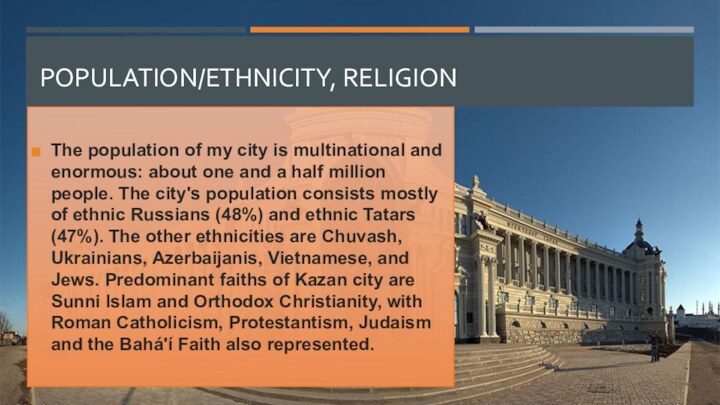
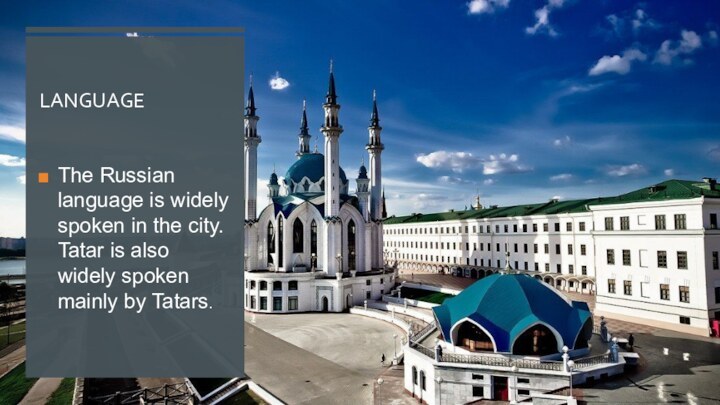
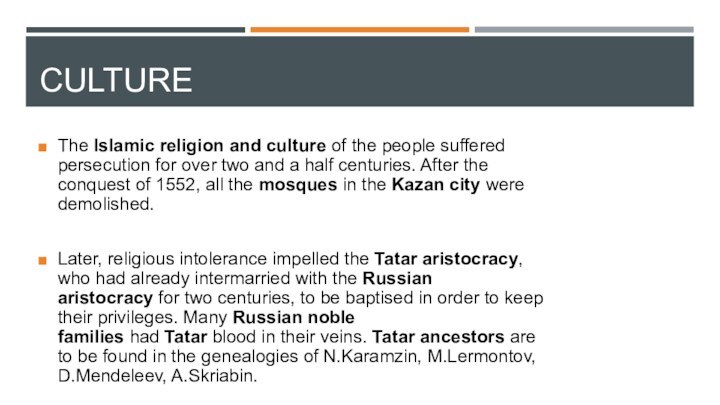
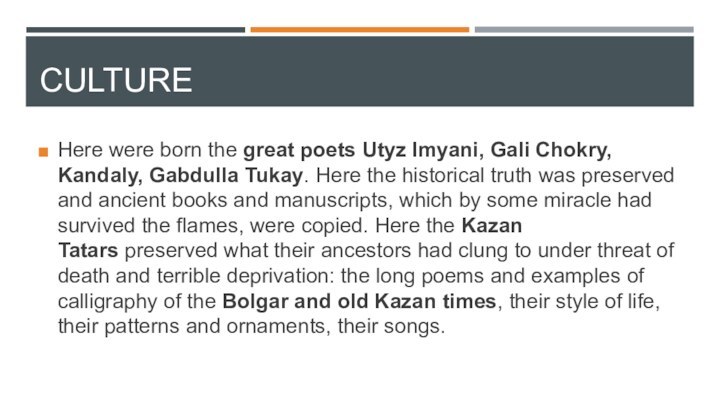
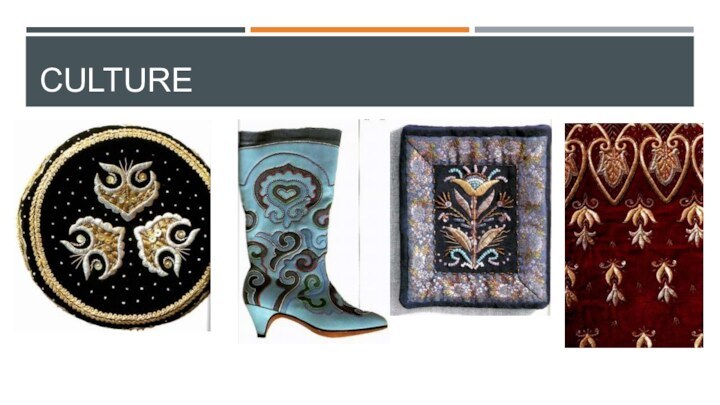
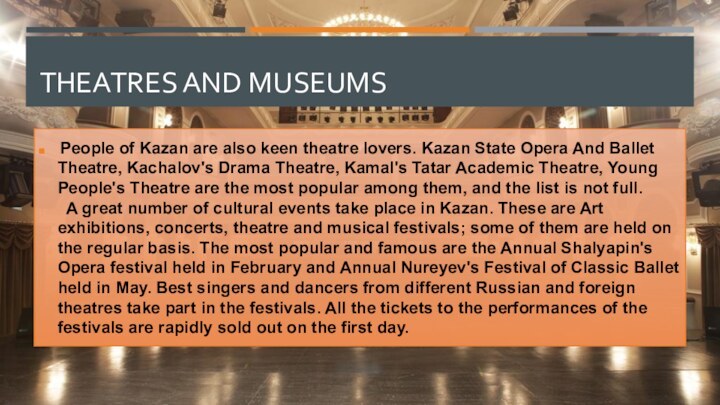
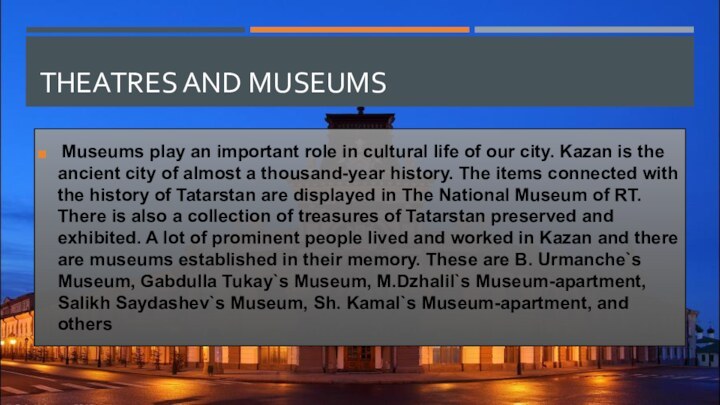
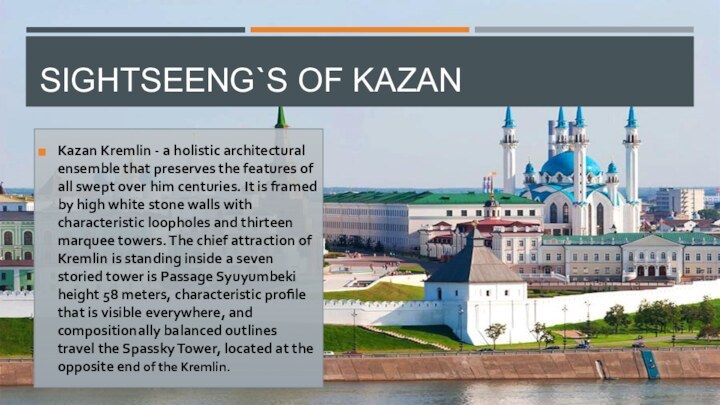
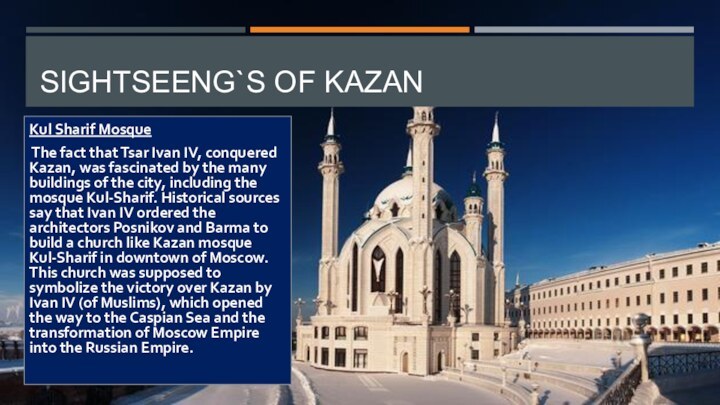
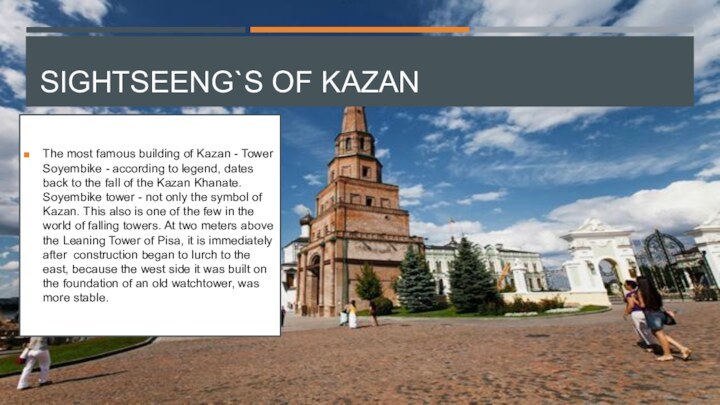
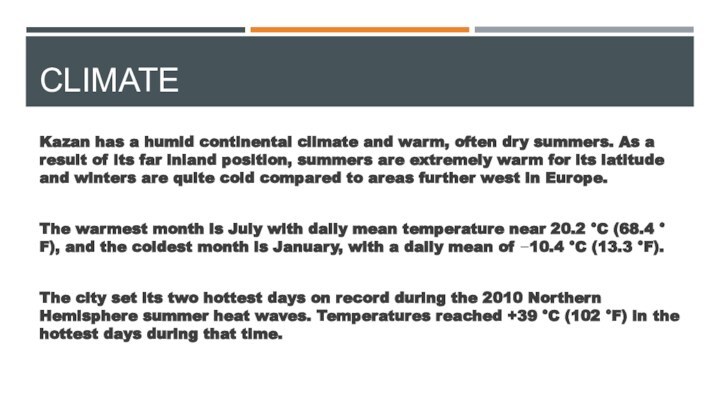
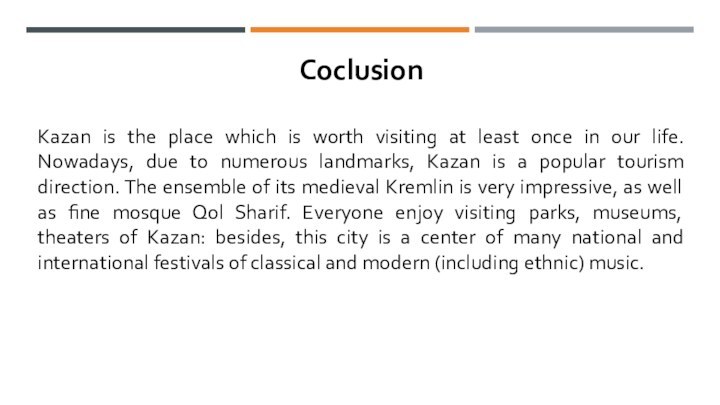


Слайд 2
TABLE OF CONTENTS:
Introduction
Population/ethnicity, religion
Language
Culture/ Theatres and museums
Sightseeng`s of
Kazan
Слайд 3
INTRODUCTION
Kazan is the capital of Tatarstan Republic. Kazan is
on the list of UNESCO World Heritage cities. Kazan is
located on the left bank of the Volga river and it was founded more than one thousand years ago. So it is a very old place, with rich and fascinating history.Текст слайда
Flag and coat of arms of Tatarstan
Слайд 4
POPULATION/ETHNICITY, RELIGION
The population of my city is multinational and
enormous: about one and a half million people. The city's
population consists mostly of ethnic Russians (48%) and ethnic Tatars (47%). The other ethnicities are Chuvash, Ukrainians, Azerbaijanis, Vietnamese, and Jews. Predominant faiths of Kazan city are Sunni Islam and Orthodox Christianity, with Roman Catholicism, Protestantism, Judaism and the Bahá'í Faith also represented.
Слайд 5
LANGUAGE
The Russian language is widely spoken in the
city. Tatar is also widely spoken mainly by Tatars.
Слайд 6
CULTURE
The Islamic religion and culture of the people suffered persecution
for over two and a half centuries. After the
conquest of 1552, all the mosques in the Kazan city were demolished.Later, religious intolerance impelled the Tatar aristocracy, who had already intermarried with the Russian aristocracy for two centuries, to be baptised in order to keep their privileges. Many Russian noble families had Tatar blood in their veins. Tatar ancestors are to be found in the genealogies of N.Karamzin, M.Lermontov, D.Mendeleev, A.Skriabin.
Слайд 7
CULTURE
Here were born the great poets Utyz Imyani, Gali
Chokry, Kandaly, Gabdulla Tukay. Here the historical truth was
preserved and ancient books and manuscripts, which by some miracle had survived the flames, were copied. Here the Kazan Tatars preserved what their ancestors had clung to under threat of death and terrible deprivation: the long poems and examples of calligraphy of the Bolgar and old Kazan times, their style of life, their patterns and ornaments, their songs.
Слайд 9
THEATRES AND MUSEUMS
People of Kazan are also keen theatre lovers.
Kazan State Opera And Ballet Theatre, Kachalov's Drama Theatre,
Kamal's Tatar Academic Theatre, Young People's Theatre are the most popular among them, and the list is not full. A great number of cultural events take place in Kazan. These are Art exhibitions, concerts, theatre and musical festivals; some of them are held on the regular basis. The most popular and famous are the Annual Shalyapin's Opera festival held in February and Annual Nureyev's Festival of Classic Ballet held in May. Best singers and dancers from different Russian and foreign theatres take part in the festivals. All the tickets to the performances of the festivals are rapidly sold out on the first day.
Слайд 10
THEATRES AND MUSEUMS
Museums play an important role in cultural life
of our city. Kazan is the ancient city of
almost a thousand-year history. The items connected with the history of Tatarstan are displayed in The National Museum of RT. There is also a collection of treasures of Tatarstan preserved and exhibited. A lot of prominent people lived and worked in Kazan and there are museums established in their memory. These are B. Urmanche`s Museum, Gabdulla Tukay`s Museum, M.Dzhalil`s Museum-apartment, Salikh Saydashev`s Museum, Sh. Kamal`s Museum-apartment, and others
Слайд 11
SIGHTSEENG`S OF KAZAN
Kazan Kremlin - a holistic architectural ensemble that preserves
the features of all swept over him centuries. It
is framed by high white stone walls with characteristic loopholes and thirteen marquee towers. The chief attraction of Kremlin is standing inside a seven storied tower is Passage Syuyumbeki height 58 meters, characteristic profile that is visible everywhere, and compositionally balanced outlines travel the Spassky Tower, located at the opposite end of the Kremlin.
Слайд 12
SIGHTSEENG`S OF KAZAN
Kul Sharif Mosque
The fact that Tsar Ivan
IV, conquered Kazan, was fascinated by the many buildings
of the city, including the mosque Kul-Sharif. Historical sources say that Ivan IV ordered the architectors Posnikov and Barma to build a church like Kazan mosque Kul-Sharif in downtown of Moscow. This church was supposed to symbolize the victory over Kazan by Ivan IV (of Muslims), which opened the way to the Caspian Sea and the transformation of Moscow Empire into the Russian Empire.
Слайд 13
SIGHTSEENG`S OF KAZAN
The most famous building of Kazan - Tower
Soyembike - according to legend, dates back to the
fall of the Kazan Khanate. Soyembike tower - not only the symbol of Kazan. This also is one of the few in the world of falling towers. At two meters above the Leaning Tower of Pisa, it is immediately after construction began to lurch to the east, because the west side it was built on the foundation of an old watchtower, was more stable.
Слайд 14
CLIMATE
Kazan has a humid continental climate and warm,
often dry summers. As a result of its far
inland position, summers are extremely warm for its latitude and winters are quite cold compared to areas further west in Europe.The warmest month is July with daily mean temperature near 20.2 °C (68.4 °F), and the coldest month is January, with a daily mean of −10.4 °C (13.3 °F).
The city set its two hottest days on record during the 2010 Northern Hemisphere summer heat waves. Temperatures reached +39 °C (102 °F) in the hottest days during that time.
